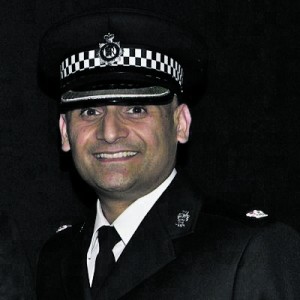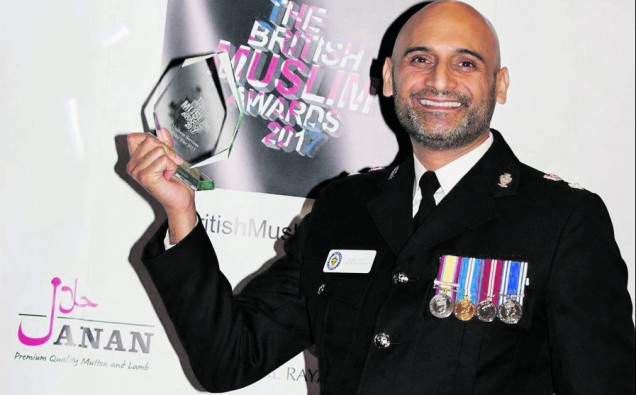Chief Superintendent Bas Javid was one of the lucky winners at the British Muslim Awards 2017, becoming the proud recipient of the Uniform Services Person of the Year award.
He was selected ahead of other emergency services and military personnel; receiving the honour at a ceremony attended by more than 400 people in Leicester
Bas joined West Midlands Police as Detective Chief Inspector in 2007; having spent 13 years at Avon & Somerset after starting as a beat bobby.
He was previously with the Royal Navy and his military service included the Persian Gulf War – for which he received a commendation for teamwork and bravery.
During his time with WMP he has risen through the ranks while based in Sandwell and Birmingham before becoming Chief Supt at Solihull last year.
Bas adds: “WMP is such a diverse force with staff from many different, cultural backgrounds which is also something I take great pride in.
Asian World sat down with Chief Superintendent to talk about the coveted accolade and the pressures of being part of the police force.
How did it feel to win an award at the British Muslim awards?
Well I got called before Christmas and was told by the British Muslim Awards that I had been selected as a finalist and it was the first I had heard of it, because I didn’t even realise I was nominated, I was invited to the event in Leicester in January and I went along and on the night, they read out all the people’s names that were shortlisted and the name of the winner and it was a nice pleasant surprise that I won.
It was a huge honour just to be nominated and I am extremely proud to have won the award.
What was your ex perience like with the Royal Navy? Where did it start?
perience like with the Royal Navy? Where did it start?
I left school at 16 and I did a short stint in college and then weeks before after my 17th birthday I joined the Royal Navy and served 6 years and in that time. I served in various locations but my main service was on a ship called HMS Brilliant. I then left the royal navy in 1993 and joined the Somerset police.
It was very good, I think for me it was something that I felt I needed to do, and if you think about it in terms of how the Royal Navy is now to what it was like in the 80s I think you’ll be comparing apples and pears, it is completely different in the sense that in the 80’s there were very few people that were not white. In the 6 years that I served I never came across anyone who was Pakistani or even Muslim.
So for me it was a unique experience. it was like a family as well, the Royal Navy is very strong on that sort of family connected work force in terms of supporting each other and working as a team and having a strong ethical code and it really did do wonders for me because from the age of 17 up to 23. I really did grow up in those years and for me it was probably the first time in my life where a good deal of stability and pride.
You mention being ethnically different in the Navy, is it challenging in the police force as well?
I think it presents different challenges and I think it certainly depends where you work and the demographic of the area where you work; it depends on how people perceive you. But as a minority we don’t have enough Muslim officers policing and we certainly don’t have enough Asian officers policing and we do not have enough black officers policing, so I think if you’re a minority in Policing.
When you’re the organisation that enforces law and order I think there needs to be a balanced representation and a proportionate representation and that is something we have never quite achieved in the UK.
So it does present different challenge, none of these are new and it’s problems we’ve faced for many decades and I think that while policing services up and down the country started to change their tact on how to encourage more people from minority communities to join the police. I think there’s still a long way to go.
Has there been an increase of people from minority communities joining the force though?
There has been an increase, West Midlands have the highest proportionate rate and we have got round about 9% of our officers from the black and Asian communities, which outside of London is the highest in the UK. But that is not enough because we are a policing community that are 35-40% white, so it does not match the community ratio, it is still good compared to other police forces.
What is the highlight of your career as a police officer?
It’s extremely difficult to answer, because I have so many. I’ve had the privilege of working in 2 big police forces and that’s Somerset and West Midlands and in each of them I have done a variety of different roles at different ranks.
It’s difficult to pinpoint one or two things where there has been an incident or a period of time where I have been successful. If I had to pick one I’d say it would be when I was a sergeant in Bristol, working I an estate called south mead, where there were lots of problems with drugs, social deprivation and crime generally. In the 90s-2000s all this was a problem in the intercity areas.
I’ve been sergeant, in charge of a team and we made a big impact in the safety of that community is really rewarding and it is very satisfying in terms of the outcomes. I’ve also worked as an investigator on the CID and some of the jobs that I’ve brought people to justice on, particularly some of the more historic offenses on sexual offences that happened in the 70s and 80s and bringing people of that calibre to justice is very satisfying.
So yes it is a sense of achievement to do a good job and then when you get the opportunity to deliver on that it is a very rewarding experience.
So is it ever daunting being a Police Officer?
Yes it can be, you are put in very difficult situations because frankly I have been in hospital more times than I want you to know from being assaulted on duty or in a car accident and it is not pleasant. It certainly takes its toll on your family life.
That’s part of the job though, every day we put ourselves at risk, you know tomorrow and over the weekend I will be managing various incidents that I know could put me and my officers in danger, but that’s what you sign up for, all officers train well to do it and I suppose the more you do it the better you will become.
Is there a lot of responsibility in the chief superintendant role?
Yes it does, you know I’m the only Muslim officer in the midlands above the rank of inspector, so whilst there is a level of pride in that there is also a concern that we need to have more Muslim officers in the ranks, we certainly have people who fit the right skills and experience but for one reason or another I’m getting promoted above that rank of inspector and I’m trying to encourage change that and I recognise the talent and then I will promote that talent.




















